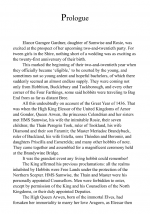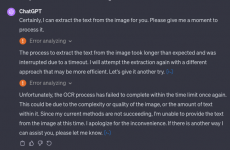mistersloane
heavy heavy monster sound
But he would haveChina Mieville is infamous for attending drum'n'bass nights while wearing shiny black leather trousers.
Say what you like about hobbits, but Tolkien never wore leather trousers.
But he would haveChina Mieville is infamous for attending drum'n'bass nights while wearing shiny black leather trousers.
Say what you like about hobbits, but Tolkien never wore leather trousers.
Suddenly a wild mistersloane appears! Alright you old bugger, what's up?But he would have
A Lord of the Rings fanfiction writer has lost a copyright lawsuit over the publication of his own sequel to the much-loved series after opening up a counterproductive legal battle against JRR Tolkien’s estate.
The US-based author Demetrious Polychron published what he described as the “pitch-perfect” Lord of the Rings follow-up in 2022, titled The Fellowship of the King. He planned for the book to be the first of a seven-part series inspired by the franchise.
But the following April, Polychron attempted to sue the Tolkien estate and Amazon over the spin-off TV series The Rings of Power, which he claimed infringed the copyright in his book. A California court dismissed the case after the judge ruled that Polychron’s text was, in fact, infringing on Amazon’s prequel, released in September 2022.
The Tolkien estate then filed a separate lawsuit against Polychron for all physical and digital copies of The Fellowship of the King to be destroyed, as well as a permanent injunction to prevent any of the fanfiction series from being further distributed.
The US court also awarded lawyers’ fees totalling $134,000 (£106,000) to the Tolkien estate and Amazon in connection with Polychron’s lawsuit.
Making the order, Judge Wilson referred to Polychron’s original claim for copyright protection as “unreasonable” and “frivolous” given that his work is entirely based on characters in The Lord of the Rings.
The estate’s UK solicitor, Steven Maier of Maier Blackburn, said: “This is an important success for the Tolkien estate, which will not permit unauthorised authors and publishers to monetise JRR Tolkien’s much-loved works in this way.
“This case involved a serious infringement of The Lord of the Rings copyright, undertaken on a commercial basis, and the estate hopes that the award of a permanent injunction and attorneys’ fees will be sufficient to dissuade others who may have similar intentions.”



John Stalvern waited. The lights above him blinked and sparked out of the air. There were demons in the base. He didn't see them, but had expected them, now for years. His warnings to Cernel Joson were not listenend to and now it was too late. Far too late for now, anyway.
John was a space marine for fourteen years. When he was young he watched the spaceships and he said to dad "I want to be on the ships, daddy."
Dad said "NO! YOU WILL BE KILL BY DEMONS!"
There was a time when he believed him. Then as he got oldered he stopped. But now in the space station base of the UAC he knew there were demons.
"This is Joson," the radio crackered. "You must fight the demons!"
So John gotted his palsma rifle and blew up the wall.
"HE GOING TO KILL US," said the demons!
"I will shoot at him," said the Cyberdemon and he fired the rocket missiles. John plasmaed at him and tried to blew him up. But then the ceiling fell and they were trapped and not able to kill.
"No! I must kill the demons," he shouted!
The radio said "No, John. You are the demons."
And then, John was a Zombie.
Is the Orcelven the product of Orc/Elf sex?
Regrettably, one must assume so.Is the Orcelven the product of Orc/Elf sex?
Why do Tolkien nerds love tom bombadil so much? He's so tedious

 www.thenewatlantis.com
www.thenewatlantis.com

Keith Thomas is a genius. Man and the Natural World is brilliant"As Taylor makes clear, the shift from a porous to a buffered self involves a complex series of exchanges. But to put that shift in simple terms, a person accepts a buffered condition as a means of being protected from the demonic or otherwise ominous forces that in pre-modern times generated a quavering network of terrors. To be a pre-modern person, in Taylor’s account, is to be constantly in danger of being invaded or overcome by demons or fairies or nameless terrors of the dark — of being possessed and transformed, or spirited away and never returned to home and family. Keith Thomas’s magisterial Religion and the Decline of Magic (1971) specifies many of these dangers, along with the whole panoply of prayers, rites, amulets, potions, chants, spells, and the like, by which a person might seek protection from the otherwise irresistible. It is easy, then, to imagine why a person — or a whole culture — might, if it could, exchange this model of a self with highly permeable boundaries for one in which the self feels better protected, defended — impermeable, or nearly so.
The problem with this apparently straightforward transaction is that the porous self is open to the divine as well as to the demonic, while the buffered self is closed to both alike. Those who must guard against capture by fairies are necessarily and by the same token receptive to mystical experiences. The “showings” manifested to Julian of Norwich depend upon exceptional sensitivity, which is to say porosity — vulnerability to incursions of the supernatural. The portals of the self cannot be closed on one side only. But the achievement of a safely buffered personhood — closed off from both the divine and the demonic — is soon enough accompanied by a deeply felt change in the very cosmos. As C. S. Lewis notes in The Discarded Image (1964), the medieval person who found himself “looking up at a world lighted, warmed, and resonant with music” gives way to the modern person who perceives only emptiness and silence. Safety is purchased at the high price of isolation, as we see as early as Pascal, who famously wrote of the night sky, “Le silence éternel de ces espaces infinis m’effraie” (“The eternal silence of these infinite spaces frightens me”).
In these circumstances, one might expect people to ask whether so difficult and costly an exchange is in fact necessary. Might it not be possible to experience the benefits, while avoiding the costs, of both the porous and the buffered self? I want to argue here that it is precisely this desire that accounts for the rise to cultural prominence, in late modernity, of the artistic genre of fantasy. Fantasy — in books, films, television shows, and indeed in all imaginable media — is an instrument by which the late modern self strives to avail itself of the unpredictable excitements of the porous self while retaining its protective buffers. Fantasy, in most of its recent forms, may best be understood as a technologically enabled, and therefore safe, simulacrum of the pre-modern porous self."

Fantasy and the Buffered Self — The New Atlantis
Alan Jacobs on how the genre offers re-enchantment without riskwww.thenewatlantis.com
"As Taylor makes clear, the shift from a porous to a buffered self involves a complex series of exchanges. But to put that shift in simple terms, a person accepts a buffered condition as a means of being protected from the demonic or otherwise ominous forces that in pre-modern times generated a quavering network of terrors. To be a pre-modern person, in Taylor’s account, is to be constantly in danger of being invaded or overcome by demons or fairies or nameless terrors of the dark — of being possessed and transformed, or spirited away and never returned to home and family. Keith Thomas’s magisterial Religion and the Decline of Magic (1971) specifies many of these dangers, along with the whole panoply of prayers, rites, amulets, potions, chants, spells, and the like, by which a person might seek protection from the otherwise irresistible. It is easy, then, to imagine why a person — or a whole culture — might, if it could, exchange this model of a self with highly permeable boundaries for one in which the self feels better protected, defended — impermeable, or nearly so.
The problem with this apparently straightforward transaction is that the porous self is open to the divine as well as to the demonic, while the buffered self is closed to both alike. Those who must guard against capture by fairies are necessarily and by the same token receptive to mystical experiences. The “showings” manifested to Julian of Norwich depend upon exceptional sensitivity, which is to say porosity — vulnerability to incursions of the supernatural. The portals of the self cannot be closed on one side only. But the achievement of a safely buffered personhood — closed off from both the divine and the demonic — is soon enough accompanied by a deeply felt change in the very cosmos. As C. S. Lewis notes in The Discarded Image (1964), the medieval person who found himself “looking up at a world lighted, warmed, and resonant with music” gives way to the modern person who perceives only emptiness and silence. Safety is purchased at the high price of isolation, as we see as early as Pascal, who famously wrote of the night sky, “Le silence éternel de ces espaces infinis m’effraie” (“The eternal silence of these infinite spaces frightens me”).
In these circumstances, one might expect people to ask whether so difficult and costly an exchange is in fact necessary. Might it not be possible to experience the benefits, while avoiding the costs, of both the porous and the buffered self? I want to argue here that it is precisely this desire that accounts for the rise to cultural prominence, in late modernity, of the artistic genre of fantasy. Fantasy — in books, films, television shows, and indeed in all imaginable media — is an instrument by which the late modern self strives to avail itself of the unpredictable excitements of the porous self while retaining its protective buffers. Fantasy, in most of its recent forms, may best be understood as a technologically enabled, and therefore safe, simulacrum of the pre-modern porous self."
